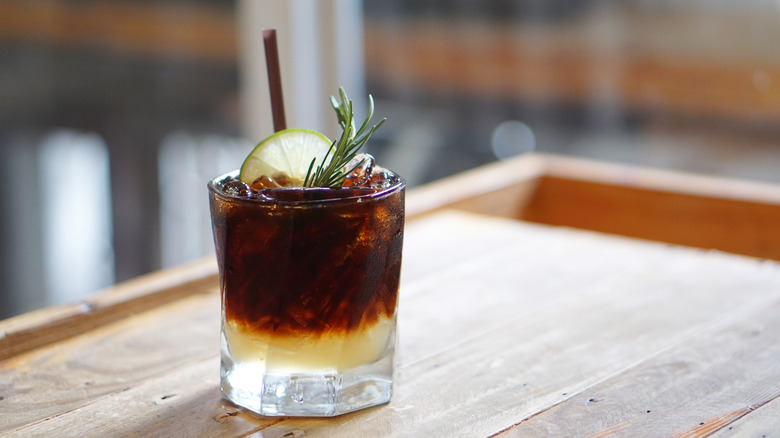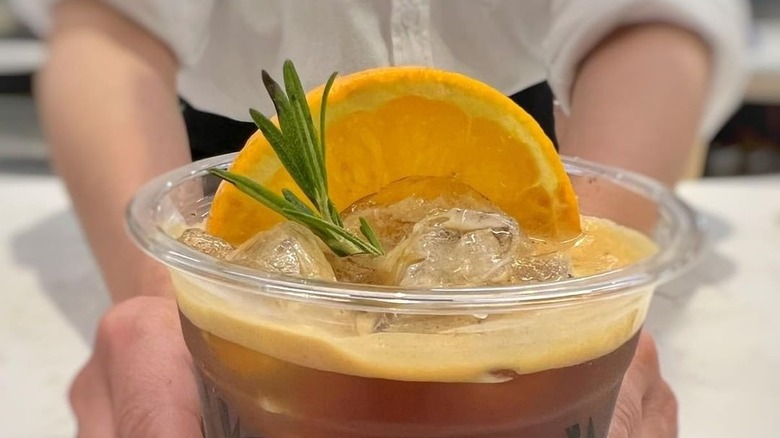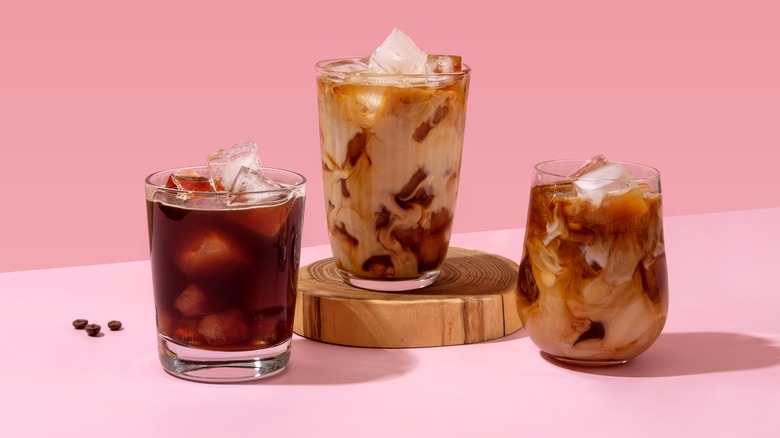The Nutritional Reason You Should Start Drinking Sparkling Coffee
How do you like your coffee in the morning? Do you normally add milk, cream, or sugar? Coffee has its share of health benefits, but all those extras are anything but good. For example, milk can reduce its antioxidant levels and decrease the absorption of chlorogenic acids, according to NutritionFacts. Chlorogenic acids are naturally occurring antioxidants with anti-inflammatory, antidepressant, and antihypertensive effects.
We're not saying you should stick to black coffee, but rather that you try something new. A good choice would be sparkling coffee, a recipe shared by Dan McLaughlin, the founder of Golden Triangle Coffee. All you need is mineral water, espresso, ice cubes, and citrus fruits. "A lot of people don't know, but citrus fruit really, really compliments the flavors of coffee," McLaughlin said in a TikTok video.
This refreshing beverage takes seconds to prepare and contains no sugar. Plus, it's just about perfect for those hot summer mornings, but you can also enjoy it as an afternoon pick-me-up. Moreover, sparkling coffee can be healthier than regular coffee, depending on the ingredients used.
Revamp your mornings with sparkling coffee
Sparkling coffee has been around for years in one form or another, but McLaughlin added his own twist to it. For example, Japanese people mix espresso with tonic or soda water and can even buy this drink from vending machines or grocery stores. A similar version is the ever-popular espresso tonic served at cafes and bars around the world. Kimbo and other brands sell their own versions of sparkling coffee, and each uses a different recipe. "It's a refreshing new way to enjoy coffee: the depth and flavor of cold brew combined with the effervescence of sparkling water," VIVIC Coffee's co-founder Graham Gould told Perfect Daily Grind.
McLaughlin's recipe calls for mineral water, espresso, fresh basil, and oranges. First, you'll put an orange slice, basil, and ice cubes into a glass. Next, add mineral water and then pour in the espresso. Sounds simple, right? You can also add a squeeze of lime or lemon, grated ginger, honey, or different spice pairings to elevate the flavor of your coffee.
Note that you don't necessarily have to use espresso. Plain or flavored coffee will work just fine. However, espresso is more concentrated than coffee, which may come in handy when the dreaded afternoon slump hits. For reference, coffee has around 71 milligrams of caffeine per cup (6 fluid ounces), whereas a 1.5-ounce espresso shot boasts 90 grams of caffeine.
Is sparkling coffee really healthier than plain coffee?
This citrusy beverage may be a little bit healthier than regular coffee due to the addition of mineral water. As it turns out, some mineral waters are rich in calcium, chlorine, potassium, iron, chromium, manganese, and other nutrients, according to a 2016 review published in Clinical Cases in Mineral and Bone Metabolism. For example, calcium supports bone development and nerve function. Iron plays a key role in red blood cell production, whereas selenium protects against oxidative stress.
Mineral water may also contain sulfate, a natural compound with mild laxative effects. Bicarbonate, a natural compound in mineral water, supports digestive health and reduces gastric acidity, notes the above review. Magnesiac and chloride aid in digestion, too. Even plain carbonated water may benefit your health, says a 2012 study featured in the Journal of Nutritional Science and Vitaminology. This beverage boosts satiety, so it may help reduce your food intake and facilitate weight loss.
Caffeine has strong diuretic effects when consumed in moderate to high doses, suggests a 2017 study published in the journal Frontiers in Nutrition. Therefore, drinking several shots of espresso might cause dehydration, but you can avoid it by adding water to the mix. Last but not least, bottled water — including mineral varieties – can amplify the body and flavor of coffee, giving your brew a rich aroma.


